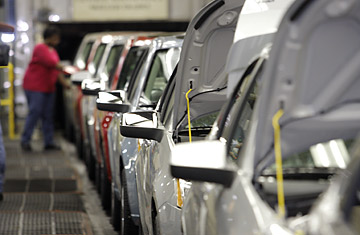
Ford Motor (left) and General Motors have discussed a possible merger or alliance in the last few weeks.
General Motors is 100 years old this year, but its chances of reaching 101 as an independent company seem to be diminishing. GM is running out of cash and ideas and pursuing merger talks with Chrysler, which is also talking to Nissan. Ford Motor Co. this year celebrated the 100th anniversary of the Model T, an invention that significantly altered almost every aspect of American life from shopping to sex. But Americans are doing demonstrably less of the former when it comes to cars. Sales are braking quickly, and this month are expected to be at their lowest level in 25 years, industry experts predict. According to J.D. Power, automakers will sell 10.8 vehicles at retail (fleet sales will add another 2.8 million). That's a drop of more than 15% from 2007. "Nobody's is coming into the showrooms," notes a senior official from Volkswagen of America.
Terrible sales, however, are only one part of the many difficulties that have engulfed American carmakers. GM, Ford and Chrysler, are also facing monumental financial challenges that have left them with poor credit ratings, making it prohibitively expensive to raise cash to finance auto sales.
Things got even worse this week. Chrysler, citing the lack of financing for car sales, announced that it was chopping 25% of its white collar work force, about 5,000 people, and a like number of contract workers. "These are truly unimaginable times for our industry," said CEO Robert Nardelli in the statement. "We continue to be in the most difficult economic period most of us can remember." GM boss Rick Wagoner told employees in an Email that the company has to make more cuts and urged anyone on the retirement fence to get off it and go, since buyout packages are being reduced. To conserve cash, GM will also stop matching 401(k) contributions for executives and its non-union workforce, beginning Nov. 1. Chrysler chopped a shift in an Ohio plant, idling 825 workers.
Emblematic of the troubles that the once mighty Big Three face are the merger discussions taking place between GM and Chrysler, which is controlled by the New York private equity firm of Cerberus. Any GM/Chrysler merger would very likely involve what amounts to battlefield surgery, requiring the traumatic amputation of several factories, hundreds of dealerships across the country and thousands of blue and white collar jobs. GM, which has been fighting rumors of bankruptcy since mid-summer, has had a hard time lining up the financing that would be needed for any deal with Chrysler, even though the U.S.Congress recently approved $25 billion in loan guarantees. In the meantime, GM is going through about $1 billion in cash a month, a situation that it can manage for the moment but not forever, according to analysts.
"Imminent bankruptcy concerns at GM/Ford appear overdone and any potential GM-Chrysler deal that enhances liquidity at the new entity may lead to a rally in GM shares as well as the shares if its dependent suppliers. But we increasingly view such a rally as potentially tenuous," said J.P. Morgan's Himanshu Pate in a recent note to investors still hanging on to shares trading at historic lows. That no longer includes Kirk Kerkorian. The Los Angeles mogul, who has made a fortune buying and selling auto stocks over the past two decades, dumped his big block of Ford shares at a substantial loss, saying there was more opportunity in gambling and oil and gas.
Meanwhile, reports surfaced that Cerberus might be willing to sell a 20% stake in Chrysler to Renault/Nissan. Any kind of agreement with Renault/Nissan will mean Chrysler has come full circle over 21 years. In 1987 it was Chrysler that acquired the American Motors Corp. from the struggling French automaker. Chrysler employees, reeling ever since Daimler AG cut them loose last summer, are now utterly demoralized as they await their fate, according to sources inside the company.
Dave Cole, chairman of the Center for Automotive Research, offers some grounds for optimism. Once the downturn passes, he says, there will be a lot of pent-up demand for new more fuel-efficient vehicles. GM is feverishly working on the Chevrolet Volt, an electric car that could go a long way towards changing the way Americans think about such cars. Even Chrysler is promising to deliver seven new models by 2010.
That's if it can get there. J.P. Morgan predicts sales levels will sink again next year and recover only marginally in 2010. "The trick is making it through the current period," Cole says. A neat trick indeed.
(See the 50 Worst Cars of All-Time here.)